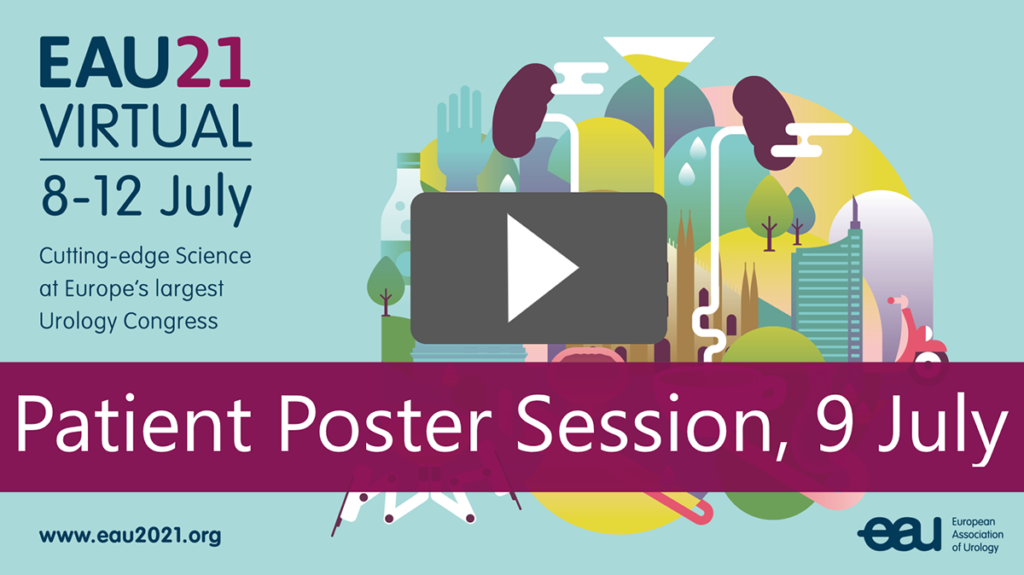Table of Contents
Authors:
S.J. MacLennan, Aberdeen (GB)
L. Makaroff, Chinnor (GB)
E. Rogers, Galway (IE)
E. Robijn, Arnhem (NL)
Key messages from the EAU21 Patient Poster Session: What have we learned?
Introduction
Since 2012, the EAU has sought to meaningfully involve patients and their families in its mission to raise the level of urological care in Europe. Well-informed patients are better equipped to talk about their conditions and treatments and this fosters more meaningful dialogue between the doctor and the patient, leading to better care.
The concept of a Patient Poster Session was developed, supported by an unrestricted grant from Pfizer. The main purpose of the Patient Poster Session was for healthcare professionals to engage directly with patients and to provide a platform (the Annual EAU Congress) where the patient’s perspective is heard, to identify any disconnects, improve communications and, ultimately, to improve patient outcomes.
EAU21 Patient Poster Session
Studies have shown that there is often a gap between what the physician recommends, based on scientific evidence combined with experience, and what patients prefer in terms of outcome, side effects, and maintaining a good quality of life.
A patient’s personal values and opinions may not be taken into consideration or compatible with the recommended treatment. As a result, healthcare professionals (HCPs) may appear to be out of sync with health-related quality-of-life matters that a patient wants to discuss.
The Poster Session theme for 2021 was: Disconnect between the physician and patient. The aim of the session was to discuss topics from a patient perspective, to encourage discussion between experts and patients, and to identify any patient-physician disconnect. Patients and patient advocates were encouraged to submit abstracts to this session and in March 2021, 13 abstracts were selected for presentation. The top-5 abstracts which received the highest ranking were selected for an award. The selected abstracts were classified under 5 sub-headings: bladder cancer, kidney cancer, prostate cancer, general oncology, functional urology and COVID-19. Each poster presentation was recorded (webcast) and made available on the EAU21 Resource Centre website within 24 hours. The Patient Poster Session took place as part of the inaugural EAU Patient Day of the EAU21 Virtual Congress on July 9, 2021.
Key messages
The Patient Poster Session outlined several important messages for clinicians, healthcare providers and the healthcare industry (see table 1). These were around patient involvement and engagement, communication, collaboration, support, finance and procedures. Each set of key messages highlights the clear unmet need for those living with and beyond urological cancer and proposes ways in which healthcare professionals and the healthcare industry can better work with patient advocates to address these.
| Patient involvement and engagement |
|
| Communication |
|
| Collaboration |
|
| Support |
|
| Finance |
|
| Procedures |
|
Table 1: Key messages from the Patient Poster Session 2021
Conclusion
In all articles submitted to the EAU for the Patient Poster Session 2021, the patient’s voice was expressed in many forms: from typical scientific articles to patient stories – and even beautiful artwork. All have value. It is hoped that the EAU can build on this pioneering initiative, which will undoubtedly shape and improve the future management of urological diseases.
Strengths and limitations
The session was well-attended, and there were 110 delegates. This compared favourably to delegate numbers attending scientific presentations by clinicians. The virtual format, however, was a challenge to patient presenters, some of whom had little experience presenting at a major international medical meeting (the EAU21 Virtual Congress). While the session concluded on time, there were some technical difficulties with presentations and answering questions, as well as little time to answer questions. A reduced number of oral presentations in 2022 will allow more time for questions. Submitted abstracts that meet selection criteria but are not presented will be displayed in the Patient Information kiosk for attendees, located adjacent to the EAU Booth on the congress exhibition floor.
Looking ahead: EAU22 Patient Poster Session
The EAU22 Patient Poster Session will be addressing the unmet needs identified in the EAU21 poster session. EAU PI encourages all patients and patient advocates to present solutions, novel approaches and best practices revolving around:
1. Physical and Psychological well-being
2. Finance and Work
3. Patient involvement in clinical research, and development of care pathways and clinical practice guidelines
4. Patient engagement /advocacy in healthcare policy
Abstract submission is closed.
EAU22 will take place from 1 – 4 July 2022 in Amsterdam, the Netherlands.
The EAU21 Patient Poster Session was funded by Pfizer Inc. Its content has been independently developed and approved by the EAU Patient Office.



